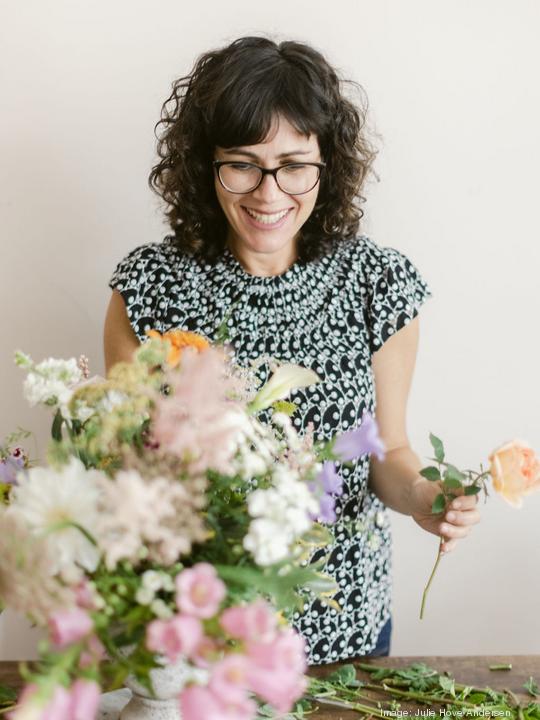
About the business: Little Acre Flowers bills itself as D.C.’s only locally sourcing florist, acquiring its inventory largely from farms within 10 to 20 miles of the city — but a little further away in winter time. It also sells locally made products and gifts. The company, based at 17th and U streets NW, largely takes orders online or over the phone for delivery, but offers a pick-up option.
How it started: Tobie Whitman was a typical D.C.-ite, as she says, with her Ph.D. in international relations and her jobs in policy and international development. But by the early 2010s, she had burned out a bit and sought “something more tangible, something more creative,” she said. There was a transition into consulting, then … flowers.
She started with Woodley Park’s Allan Woods Flowers — Woods himself served as Whitman’s mentor and remains a close friend — before venturing out on her own in early 2014 (but still operating, initially, out of Allan Woods Flowers). Around Valentine’s Day that year, she wanted to test her proof of concept: that there would be significant interest in a florist that exclusively sold “beautiful, fresh sustainable flower arrangements” with locally sourced goods.
There was “a ton,” Whitman said. And the company grew from there, through pop-ups initially and then its U Street studio. She had found her new career.
Pandemic effect: Flowers are a very forecastable industry. The hottest times of the year surround Valentine’s Day and Mother’s Day. Then there’s Easter and Passover, teacher appreciation week and administrative professionals day and other celebrations like that. Whitman knows when she’ll be particularly busy.
In March 2020, the demand stopped. That break didn’t last long, but it did upset the forecasting a bit, which took time to fully grasp, Whitman said.
“We had a bad month or six weeks,” Whitman said. “Then people were at home, on their computers, trying to make themselves feel better, trying to connect with people.”
Her client base, she said, was just home, not going out, not traveling.
They had disposable income. And some spent it on flowers.
Pandemic pivot: In January 2020, Whitman and her team expanded into the events business, an idea that lasted until the pandemic shut events down. Rather than laying anyone off, Whitman pivoted to focus on a growing weekend floral traffic. Her events manager became Little Acre’s weekend manager.
“There were no layoffs,” she said. “Only hiring.”
Little Acre is now up to 10 employees. And while she didn’t go into specific figures, Whitman said her revenue is up 40% to 50% since the start of the pandemic. That’s only been boosted by the company’s fairly new subscription service, which can be custom designed so that arrangements are delivered weekly, every other week or monthly.
The challenge: Little Acre’s partners are largely found in Northern Virginia and Maryland, but during the colder months, it broadens its reach to North Carolina to maintain its supply. That’s when supply chain issues crop up.
Recently, for example, it was contacted by a corporate client interested in a large, mid-December delivery. “It was such a size, I don’t know if we can do that,” Whitman said. “It is harder to find things in the winter.”
A second challenge: Space. Whitman said Little Acre will likely have to expand beyond U Street if its growth continues as it has. So she’s got irons in the fire, looking for ground-floor warehouse-like space, or even a second-generation restaurant. But those are hard to come by, she said; everybody wants one of those.
Whitman said she hopes to stay in the District, perhaps maintaining the existing storefront while growing into a separate space for production.
What’s next: Little Acre recently launched a line of locally sourced products that can be shipped nationally — chocolate, plants and floral confetti, for example — and Whitman is weighing an expansion, at least within the Mid-Atlantic. She’ll see how the event business evolves, as it returns.
In the meantime, the former senior conflict specialist with the U.S. Agency for International Development has found her calling.
“I love the business side. I love the aesthetic side,” Whitman said. “In a small business you get to do it all.”